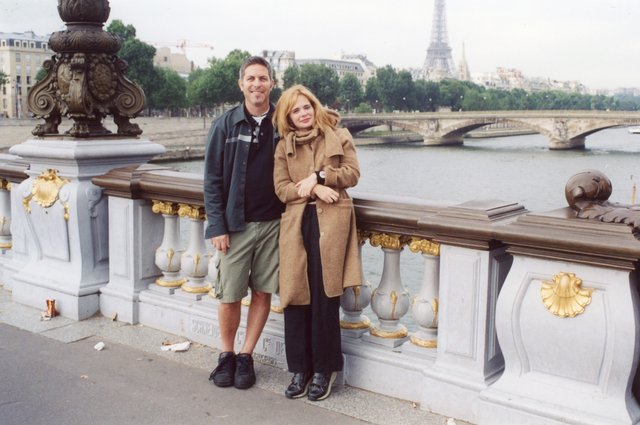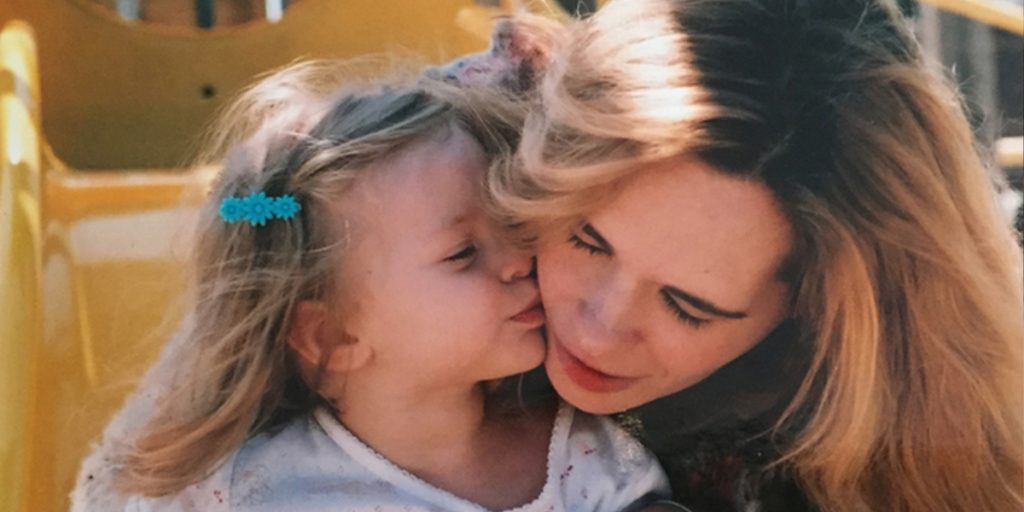Andy Ostroy’s documentary on the life and career of his wife, filmmaker and actor Adrienne Shelly is a simultaneously somber and heartbreaking yet life-affirming and inspiring collage.
Adrienne Shelly was an American actress who worked in independent films in the late 1980s, 1990s and early 2000s. She is best known for starring in two films by auteur Hal Hartley, The Unbelievable Truth (1989) and Trust (1990), and for writing, directing and acting in Waitress (2007), released posthumously and since adapted as a musical by Sara Bareilles. All three films are masterpieces. She passed away in November 2006 at the age of 40, leaving two-year-old daughter Sophie without a mother. The Adrienne Shelly Foundation was established after her death, a not-for-profit that supports women filmmakers.
From the outset, we are made aware that Shelly died an untimely death in 2006. Whenever I have seen her name in media or academia published since then, it has always been accompanied not only by the fact that she died, but also the manner in which it happened. It is sensationalistic, and not right that such a detail about someone who inspired such positivity in her storytelling and in how she treated others should be so indelibly ingrained in her legacy, and her widower Andy Ostroy wants to change that. But is it really possible? Can we really mentally divorce a loved one’s cause of death, especially when they were murdered, from the grief that will always pervade our minds?
Ostroy asks theatregoers waiting outside to see Waitress (the musical) in Broadway if they know who Adrienne Shelly is. The best anyone can muster is “I can see her name on the poster”. It’s a testament to just how truly ‘independent’ her work was that her name is still known by so few. Like her friend and collaborator Hal Hartley, she never sought to leap into mainstream Hollywood productions. She made rare television appearances, most prominently in individual episodes of Law and Order and Oz around the turn of the millennium, and appeared in Factotum (2005), a Charles Bukowski adaptation.
Sophie, Adrienne’s 15-year-old daughter, is intelligent and very eloquent. On the topic of catharsis, she regrets that “I haven’t had a good cry in years”, noting that forgoing catharsis is counterproductive. She is an excellent speaker, and her comments are always insightful. Several scenes with her are heartbreaking as she describes growing up deprived of her mother, but she has remarkable emotional fortitude and speaks maturely on the matter. I found this information valuable and Sophie’s words to be very moving. The film is very sad, but does not neglect to show and tell us about Shelly’s ebullient optimism in the face of adversity.

We learn that Shelly was always concerned about her own mortality, ever since her father died of a heart attack when she was 12 (since then, she used his first name as her last name to honour him). Ostroy very cogently communicates the crisis of having to explain to a toddler that they have just lost a parent. It brought me back to maybe 2003 or so, when I first came to terms with the concept of death – I remember struggling to fathom that our time has to come to an end at some point. At that age, most of us just cannot grasp the gravity and finality of the topic – and losing a parent at such an age when one is old enough to remember things yet too young to really understand death is completely unenviable.
I love how the film examines her both as a person and an artist, but I do wish it had given a broader overview of her earlier directorial work. While Waitress seems like the most obviously autobiographical of her films and is by far her most well-known, her lesser-seen films from the 90s are only briefly touched upon with tiny excerpts. Given how hard it is to obtain some of these films even today without resorting to piracy, telling us more about what these films are about would have been a great way to inspire viewers to seek them out. Ostroy’s honesty about some of the films she acted in but didn’t write or direct is welcome: “she did a lot of really crappy movies in the 90s,” he bluntly remarks.
Making stories is an inherent part of the human condition, as it is one of the main ways in which we attempt to make sense of things. In search of information, Ostroy sends a letter to the murderer in prison, and is shocked to receive a reply. Even more shocking is the contents of the reply – the murderer has agreed to meet Ostroy, who is tormented by not knowing all the details of that night in November 2006. The actual process of finding the culprit is detailed by a detective who worked on the case – it’s fascinating but scary to learn about how easily he could have got away with it. Ostroy just wants to know the truth. He’s ready.
Shelly’s spirit really shines through in the home videos and in her mother, husband, daughter and friends’ testimonies. She sought humour and enjoyment in everything – how else would Waitress, a film about domestic abuse and personality crisis, be so entertaining? She was also, crucially, a fighter. One of my favourite clips is one where she discusses how as a short, blonde woman directing films in the 1990s, that she was dismissed by many and not always taken seriously. “It’s harder for women… but it’s hard for everybody,” she opines. She always saw the bigger picture, and recognised that just because you may face greater adversity in a field than others doesn’t mean that they don’t face any themselves.
One of my favourite stories recounted is when Hal Hartley talks about dealing with Harvey Weinstein, who had just obtained The Unbelievable Truth for distribution. Weinstein wanted the film to have nudity, and tried to convince Hartley to film some nude scenes involving Shelly’s character Audry (additionally, one poster for Trust took one of the final shots of Shelly and Martin Donovan (Tenet) and superimposed a half-naked body over hers – despite no such image existing in the actual film). Hartley refused – “the film was fine [as it was]”. Shelly was fiercely supported by Hartley, and she was obstinate in her own loyalty to the people she respected, loved and worked with. Is it any wonder a person that stuck so unrepentantly to her guns never achieved mainstream fame and ‘success’?
Ostroy succeeds in making a film with broad appeal, and everyone will appreciate something, regardless of whether of whether you’re going in blind or are already familiar with Shelly’s life and work. But crucially, it’s uncompromising and authentic. To me, a Hal Hartley fan and champion of Waitress, it was an informative means to learn more about such an important and sadly overlooked individual in cinema, and the autobiographical factors that influenced a lot of her work. She had a genuinely unique artistic voice and Ostroy does a great job at showcasing this through film clips, home videos and contributions from friends and colleagues. If you are interested in indie cinema and want to learn about one of the most important female directors in the history of cinema, watch Adrienne.
Adrienne is now available to watch on HBO Max.

